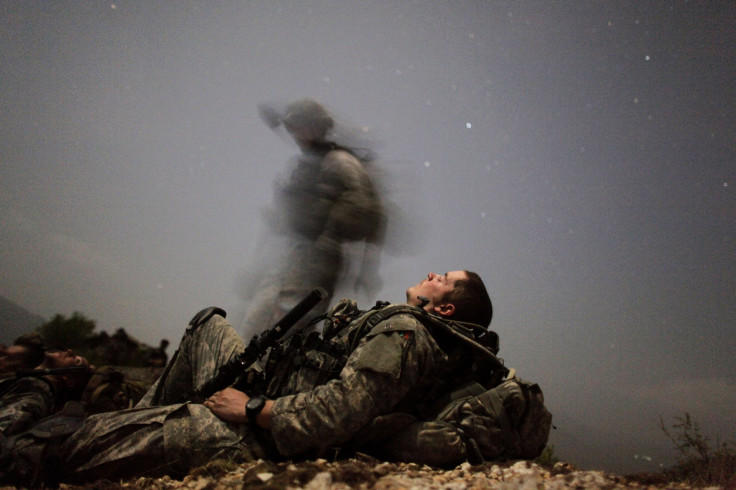
Latino USA recently aired a story on Yvona Rodriguez, Marine combat veteran who served two tours of duty in Iraq and Afghanistan (see full story, below). Like many combat vets, Rodriguez struggles with PTSD, psychological trauma that resulted from his service. Like some of his peers, Rodriguez turned towards marijuana to help with PTSD. Unlike other veterans, though, Rodriguez is an immigrant. Born and raised in Ecuador, he has had to defend himself from deportation. The already dysfunctional VA bars prescriptions for marijuana.
"I would hear so many statistics of marines and infantry men killing themselves -- it would be like 22 a day -- I don’t want to be part of the statistics. I would never want to ... escape that way,” Rodriguez told Latino USA.
Cannabis was one thing that actually helped. Specifically, it Rodriquez told Latino USA that unlike prescribed pharmaceuticals, smoking pot would calm the feverish thoughts and dreams of combat that made it hard for him to sleep.
Rodriguez successfully fought a deportation order. He is now applying for citizenship. To hear his voice, and his war stories, listen to the audio story below.
“I swore an oath to the constitution. Is that enough?”
It's difficult to find statistics on drug-related deportations of veterans. Whatever the number is, there are a few reasons why deportations of veterans like Rodriguez may be slowing down, and could stop all together.
1) Legalization & Decriminalization
Marijuana is increasingly legal and decriminalized around the U.S. Unfortunately for Rodriguez, he doesn’t live in the growing numbers of cities and states that have legalized marijuana use recreationally, medically or decriminalized it.
In California for example has both decriminalized marijuana, making it a ticketable, not jailable offense. Without stacking up misdemeanors for possession and consumption, immigrant vets don’t have to worry about being forcibly deported from the country they’ve fought to protect.
More states such as Alaska are moving forward on legalizing pot.
2) Veteran’s Appropriation Bill
Last week, the Senate passed an appropriations bill that included an amendment to make cannabis more available to veterans. Specifically, it would chuck an existing ban on Veterans Affairs hospital doctors from prescribing cannabis to patients, such as those with PTSD or chronic pain.
A spokesman for the pro-pot Drug Policy Alliance has welcomed the bill, which some are saying has a chance of passing in the house.
“Veterans in medical marijuana states should be treated the same as any other resident, and should be able to discuss marijuana with their doctor,” said Michael Collins, deputy director of national affairs for the Drug Policy Alliance, a pro-pot policy group. “It makes no sense that a veteran can’t use medical marijuana if it helps them and it is legal in their state.”
That’s not too far from the VA’s own statements, though the agency wants to expand research on effects of marijuana and its usefulness for treating PTSD.
“Treatment providers should not ignore marijuana use in their PTSD patients. [Our] Clinical Practice Guideline [...] recommends providing evidence-based treatments for the individual disorders concurrently,” states the VA website . “PTSD providers should offer education about problems associated with long-term marijuana use and make a referral to a substance use disorder (SUD) specialist if they do not feel they have expertise in treating substance use.”
According to the DPA, other federal programs such as Medicaid, Medicare, and CHIP allow their doctors to discuss and prescribe marijuana.
3) Presidential Candidate Embrace Reform
There is a reason why marijuana hasn’t been tested for its effectiveness, and it’s not just a lazy VA. As a DEA Schedule I narcotic, federal prohibits funds from being used in research. All of the Democratic and some of the Republican 2016 field has signaled a willingness to open up the nation’s drug laws.
Some are embrace decriminalization, which would shield vets from felonies and maybe misdemeanors. Others are propose knocking marijuana down or even off the DEA list, allowing for research. Still others embrace non-psychoactive cannabinoid medications -- drugs that give a more physical and less mental high.
4) Executive Actions
The White House says that it’s not trying to deport immigrants with three or less misdemeanors, even if they’re undocumented. That means that pot smokers who get caught less often than Rodriguez have gained some level of security.
5) Media attention
Rodriguez beat deportation after an immigration judge ruled in his favor. He’s not sure why he won a dismissal of the removal order, but credits his military service, as well as attention from Latino USA.
© 2025 Latin Times. All rights reserved. Do not reproduce without permission.



